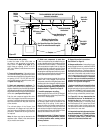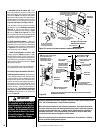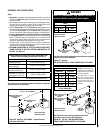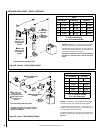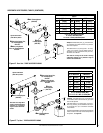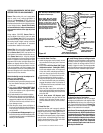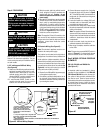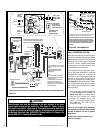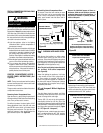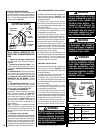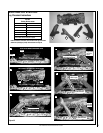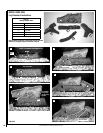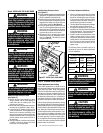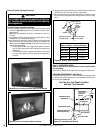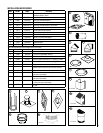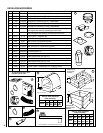
NOTE: DIAGRAMS & ILLUSTRATIONS ARE NOT TO SCALE.
25
Figure 49
OPENING CONTROL
COMPARTMENT DOOR
Control Valve
Lower Control
Compartment Door
Lift the Lower Control
Compartment Door
up and pull out to
remove.
Up
Out
Hook Catch
Reinstalling Control Compartment Door:
To reinstall, insert the hook catches on each
side of the door into the corresponding slots
in the control compartment opening, then
gently push forward and slide down until it
locks in place.
Replace logs if removed for pilot inspection.
To light the burner; turn “ON” the remote wall
switch and rotate the gas valve control knob
counterclockwise to the “ON” position.
Figure 52
Proper Pilot Flame Appearance
Thermocouple
Thermopile
Pilot
Nozzels
1/8" Min.
(3 mm)
Igniter Rod
Hood
HONEYWELL MILLIVOLT PILOT ASSEMBLY
Figure 51
Thermocouple
Thermopile
Pilot
Nozzels
SIT MILLIVOLT PILOT ASSEMBLY
3/8" Min.
(9 mm)
Igniter Rod
Hood
Proper Pilot Flame Appearance
3/8" Min.
(9 mm)
TEST ALL CONNECTIONS FOR GAS LEAKS
(FACTORY AND FIELD):
WARNING
Never use an open flame to
check for leaks.
Turn on gas supply and test for gas leaks using a
gas leak test solution (also referred to as bubble
leak solution).
Note: Using a soapy water solution
(50% dish soap, 50% water) is an effective leak
test solution but it is not recommended, because
the soap residue that is left on the pipes/fittings
can result in corrosion over time.
A. Light the appliance (refer to the lighting
instructions label in control compartment or
homeowner's manual).
B. Brush all joints and connections with the gas
leak test solution to check for leaks. If bubbles
are formed, or gas odor is detected, turn the
gas control knob (off/pilot/on) to the “OFF”
position. Either tighten or refasten the leaking
connection, then retest as described above.
C. When the gas lines are tested and leak free be
sure to rinse off the leak testing solution,
D. Turn on burner then observe the individual
tongues of flame on the burner. Make sure
all ports are open and producing flame evenly
across the burner. If any ports are blocked, or
partially blocked, clean out the ports.
CONTROL COMPARTMENT ACCESS /
LOUVER PANEL INSTRUCTIONS (Ref.
Figure 49 )
NOTE: The top louvered panel and the bottom
louvered control panel door remove and install
the same way as follows:
The gas controls can be found behind the control
compartment access door.
Removing Control Compartment Door:
Open the door by gently lifting it upward until
the hook catches on both sides clear the locating
slots. Then pull door out to remove.
On millivolt systems, the piezo igniter, HI/LO
flame adjustment knob, and pilot and main
gas OFF/ON control knob are located below
the glass panel enclosure. The gas valve for
electronic systems is also located below the
glass enclosure panel. See
Figure 50.
Figure 50
Step 7. CHECKING APPLIANCE OPERA-
TION
With the gas line installed, run initial system
checkout before closing up the front of the
appliance. Follow the pilot lighting instructions
provided in the Homeowner's Care and Opera
-
tion Instructions. For piezo igniter location see
Figure 50 (millivolt appliances only).
Note: The (pull-out) Lighting instructions label
can be found in the control compartment
(see Figure 50).
When first lighting the appliance, it will take
a few minutes for the line to purge itself of
air. Once purging is complete, the pilot and
burner will light and operate as indicated in
the instruction manual. Subsequent lightings
of the appliance will not require such purging.
Inspect the pilot flame.
SIT and Honeywell Millivolt Appliance
Checkout
The pilot flame should be steady, not lifting
or floating. Flame should be blue in color with
traces of orange at the outer edge.
The top 3/8" (10 mm) at the pilot generator
(thermopile) and the top 1/8" min (tip) of the
quick drop out thermocouple should be engulfed
in the pilot flame. The flame should project 1" (25
mm) beyond the hood at all three ports (
Figure
51 - SIT, Figure 52 - Honeywell )
To light the burner; rotate the gas valve control
knob counterclockwise to the “ON” position
then turn “ON” the OFF/ON switch (installed
at
Step 4).
Sit and Honeywell Millivolt Gas Valve
Showing Piezo Igniter Location (Each Unit is
Equipped with Only One of these Gas Valves)
SIT Gas Valve
Shown with control
compartment door
removed
Piezo Igniter
Honeywell
Gas Valve
Observe the individual tongues of flame on
the burner. Make sure all ports are open and
producing flame evenly across the burner. If
any ports are blocked, or partially blocked,
clean out the ports.



